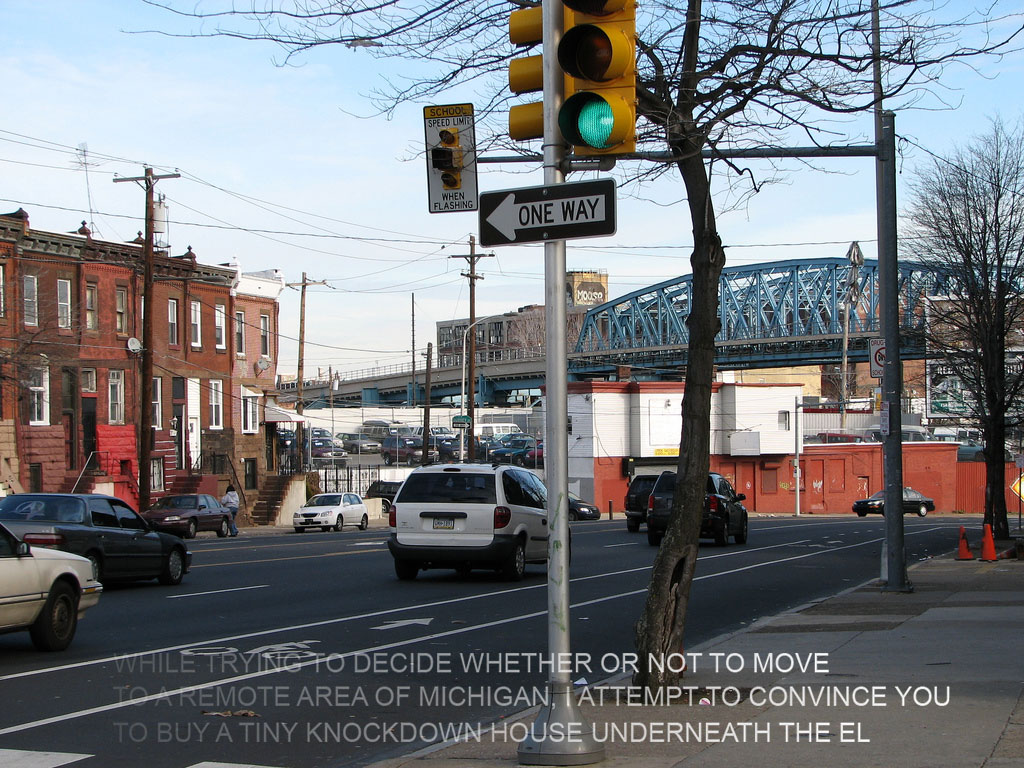
Krys Malcolm Belc
WHILE TRYING TO DECIDE WHETHER OR NOT TO MOVE TO A REMOTE AREA OF MICHIGAN, I ATTEMPT TO CONVINCE YOU TO BUY A TINY KNOCKDOWN HOUSE UNDERNEATH THE EL
We’ve had these fights before, the ones in which the decision we make means a lot more than the thing we buy or don’t buy. Take our car, for example. We almost divorced deciding whether to buy a car to fit five or six; in the dealership while our older boys climbed into and out of fresh trunks, you drummed your hands on your pregnant belly and stared into backseats that couldn’t handle any more of us. When we took our shiny, new five-seater home, it spent its days on our corner, where we could watch it from our living room window, minding it through the hum of Philadelphia life as it stood resolutely through all of Kensington’s comings and goings.
Walking under the El in the thick of summer, I find reasons to go out of my way to look at the house I want to buy: the plastic chairs outside, the cracked stoop, the discolored brick—discolored in a way that looks intentional, like artfully faded jeans. This house–my house—is blocks from the Palestinian ice cream place, the one with the elaborate stone fountain placed strangely in its side yard beside picnic tables. A fence goes up around my house near the end of summer, when someone buys its neighbor and decides to fix their shared, fractured sidewalk. I lace my fingers through the wire and try to peer in. When the El rattles by overhead, everything underneath vibrates: the coins on the sidewalk, the soles of my sneakers, my house’s aged shutters. I send you a link, again. You call my house a knockdown. And who willingly buys a house right under the train, anyway?
We do not buy the house. We move to Michigan. Google tells me there is a bus station 4.3 miles from our house here; a bus is not the same as a train. I do not have an entire day to drive six hours to Chicago to stand under El tracks. Nothing in this town has a broken beauty like the house underneath the El did. I miss the train screeching, the smell of baklava and ice cream, the graffiti and the thunderous noise of Front Street. I want you to know that months after I last walked away I still think about it: the crumbling brown brick, the smell of old things—old carpets, old paint, old owners—that wafted out when I ran by again and again. Feeling the booming train along my hands, down through each finger. The overgrown empty lot next door: beautiful, in its way. A life that could have been. A thousand miles away on a Monday night I look out our kitchen window into the small-town black and see sirens. I pull you outside. Our neighbor’s work van has been smashed by a reckless driver who is standing beside the wreckage of his little car. Our neighbor stares at us as if we are from another universe. I don’t understand how you didn’t hear that, he says. I felt my whole house shake.
 Krys Malcolm Belc is a transgender writer and proud former Philadelphia public school teacher who recently relocated to snowy Marquette, Michigan, where he is a first year MFA candidate in the creative writing program at Northern Michigan University. His work has recently appeared or is forthcoming in 45th Parallel, The Monarch Review, and Reservoir.
Krys Malcolm Belc is a transgender writer and proud former Philadelphia public school teacher who recently relocated to snowy Marquette, Michigan, where he is a first year MFA candidate in the creative writing program at Northern Michigan University. His work has recently appeared or is forthcoming in 45th Parallel, The Monarch Review, and Reservoir.
Image credit: chrisinphilly5448 on Flickr
Read more from Cleaver Magazine’s Issue #18.



